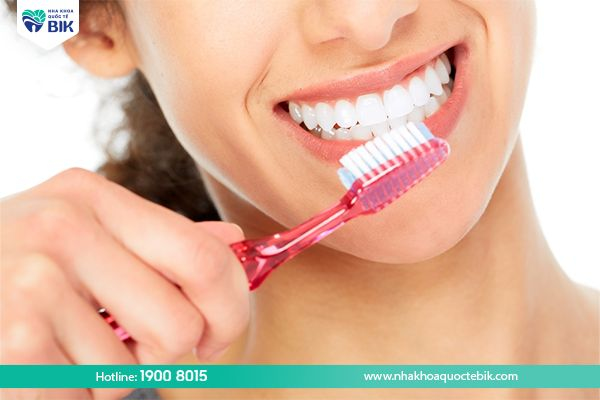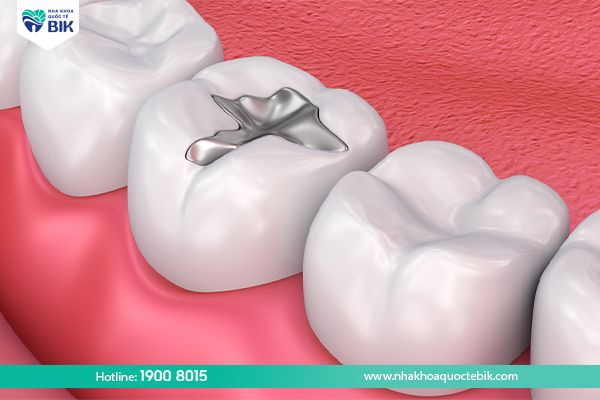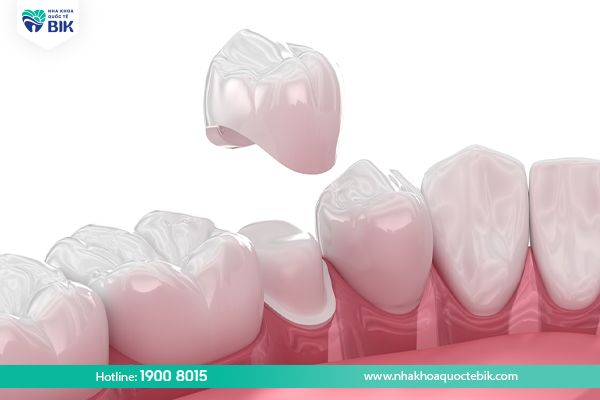Teeth weakening can be caused by improper oral hygiene and many other reasons. If not treated promptly, it can lead to other serious complications. In fact, when teeth are found to be weakened, customers should go to the dentist for examination and from there, what to do with weak teeth will depend on the specific cause of this condition.
1. Causes of weak teeth
Teeth weakening can be caused by the following reasons:
1.1. Due to incorrect brushing
Brushing teeth is a basic daily oral hygiene practice, but if done incorrectly, it can also have a negative impact on teeth or gums. When brushing teeth with too much force or brushing horizontally instead of vertically, it can cause teeth to wear down over time and become weaker. In some cases, the dentin is exposed, or the tooth neck is worn into a V shape.
The more enamel is lost, the more uncomfortable it will be for the patient when eating and drinking as well as daily activities. In addition, not brushing your teeth enough times a day will also cause thick plaque to accumulate, causing gingivitis, bad breath, tooth decay, … and weakening the teeth over time.

1.2. Unscientific diet
In fact, not only oral hygiene but also the daily diet of customers can affect the teeth. Studies show that the acidic compounds in some foods can cause tooth enamel to dissolve. Therefore, carbonated drinks and sour foods such as oranges, lemons, grapefruits, etc. can weaken teeth.
When using these foods, customers should rinse their mouths with water first to reduce the amount of acid in the teeth and then clean their teeth. In addition, some foods with high sugar content such as candy, dried fruits, etc. should also be limited to protect healthy teeth.

1.3. Due to using toothpicks
Toothpicks have long been used as a tool for oral hygiene. However, this method is not recommended because the hardness and sharpness of the toothpick can accidentally destroy the enamel, causing gum damage. People who regularly use toothpicks are at higher risk of oral diseases such as gingivitis, periodontitis, etc. than those who do not use them.

1.4. Due to antibiotic abuse
Using antibiotics incorrectly or in the wrong dosage can have a strong impact on tooth enamel. Many patients experience tooth discoloration or erosion due to the side effects of antibiotics. Therefore, before using any medication, patients need to be examined by a doctor for specific treatment instructions.

2. Signs of weak teeth
Weak teeth can be recognized by the following signs:
2.1. Tooth enamel wear
Normally, tooth enamel can wear down over time and this is a physiological tooth wear process. There are many reasons that lead to teeth wearing down faster than normal. This is also the first and important sign that your teeth are gradually weakening.
2.2. Frequent toothache
When the enamel is worn away, the dentin is exposed, making the teeth vulnerable to damage, affecting the pulp, making the teeth more sensitive than usual. If you often feel toothache when eating food that is too hot or too cold,… it means that the enamel has been destroyed.

2.3. Bleeding gums
Bleeding gums often appear when teeth are weakened and become more sensitive. Friction can easily occur when teeth are impacted too strongly during brushing or chewing.
2.4. Receding gums
When teeth are weakened, the periodontal system supporting the teeth will also be affected to a great extent and receding gums is a symptom that needs to be noted. Gum recession can occur due to many different causes and its complications are very serious such as gingivitis, gum infection, jawbone loss, etc.
3. What to do with weak teeth?
When you notice that your teeth are weak, you need to go to the dentist for examination and find out the exact cause of the disease. From there, the doctor can prescribe the most appropriate treatment plan for high efficiency:
3.1. Weak teeth due to tooth structure
In case the weak teeth are due to tooth structure, the doctor can prescribe one of the following two methods:
3.1.1. Tooth filling
Before filling the tooth, the doctor will clean the damaged tooth and then pour the enamel replacement compound into the cleaned hole. Next, a specialized dental glue will be used to seal the gap, wait for it to dry, and then the tooth will restore its normal chewing ability.

3.1.2. Porcelain crowns
Porcelain crowns are not only a cosmetic dental restoration method but also help to almost completely restore chewing ability because porcelain crowns can withstand 5 times the force of real teeth. With this method, the doctor will grind the tooth stump that needs porcelain crowns according to a certain ratio and then attach the porcelain crown on top. This crown also protects the root of the real tooth from the effects of bacteria and external collisions.

3.2. Weak teeth due to periodontal disease
Periodontal disease is the name of the tissue surrounding the teeth that plays a role in supporting and stabilizing the teeth in the jawbone. Periodontal disease often starts from the gums and then gradually spreads to the ligaments and alveolar bone below. If not treated promptly, the teeth will gradually weaken and may fall out quickly.
The main cause of periodontitis is the attack of bacteria in tartar, so the first technique that the doctor will perform is scaling. Next, depending on each specific oral condition, the doctor will prescribe an appropriate treatment plan.
So what to do with weak teeth depends on the specific cause of this condition. As soon as you discover that your teeth are getting weaker, you should go to a reputable dental clinic for examination and treatment as advised by your doctor to quickly and effectively overcome this condition.


















